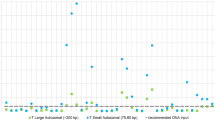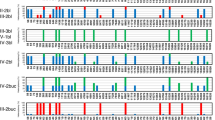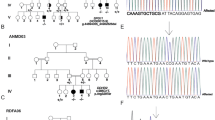Abstract
The purpose of the present study was to identify mitochondrial DNA (mtDNA) polymorphisms and rare variants that associate with elite Japanese athletic status. Subjects comprised 185 elite Japanese athletes who had represented Japan at international competitions (that is, 100 endurance/middle-power athletes: EMA; 85 sprint/power athletes: SPA) and 672 Japanese controls (CON). The entire mtDNA sequences (16 569 bp) were analyzed by direct sequencing. Nucleotide variants were detected at 1488 sites in the 857 entire mtDNA sequences. A total of 311 variants were polymorphisms (minor allele frequency⩾1% in CON), and the frequencies of these polymorphisms were compared among the three groups. The EMA displayed excess of seven polymorphisms, including subhaplogroup D4e2- and D4g-specific polymorphisms, compared with CON (P<0.05), whereas SPA displayed excess of three polymorphisms and dearth of nine polymorphisms, including haplogroup G- and subhaplogroup G2a-specific polymorphisms, compared with CON (P<0.05). The frequencies of 10 polymorphisms, including haplogroup G- and subhaplogroup G2a-specific polymorphisms, were different between EMA and SPA (P<0.05): although none of these polymorphisms differed significantly between groups after correcting for multiple comparison (false discovery rate q-value⩾0.05). The number of rare variants in the 12S ribosomal RNA and NADH dehydrogenase subunit I genes were also higher in SPA than in CON (P<0.05). Analysis of the entire mtDNA of elite Japanese athletes revealed several haplogroup- and subhaplogroup-specific polymorphisms to be potentially associated with elite Japanese athletic status.
Similar content being viewed by others
Log in or create a free account to read this content
Gain free access to this article, as well as selected content from this journal and more on nature.com
or
Accession codes
References
De Moor, M. H., Spector, T. D., Cherkas, L. F., Falchi, M., Hottenga, J. J., Boomsma, D. I. et al. Genome-wide linkage scan for athlete status in 700 British female DZ twin pairs. Twin Res. Hum. Genet. 10, 812–820 (2007).
Bray, M. S., Hagberg, J. M., Perusse, L., Rankinen, T., Roth, S. M., Wolfarth, B. et al. The human gene map for performance and health-related fitness phenotypes: the 2006-2007 update. Med. Sci. Sports Exerc. 41, 35–73 (2009).
Roth, S. M., Rankinen, T., Hagberg, J. M., Loos, R. J., Perusse, L., Sarzynski, M. A. et al. Advances in exercise, fitness, and performance genomics in 2011. Med. Sci. Sports Exerc. 44, 809–817 (2012).
Pitsiladis, Y. & Wang, G. Necessary advances in exercise genomics and likely pitfalls. J. Appl. Physiol. 110, 1150–1151 (2011).
Anderson, S., Bankier, A. T., Barrell, B. G., de Bruijn, M. H., Coulson, A. R., Drouin, J. et al. Sequence and organization of the human mitochondrial genome. Nature 290, 457–465 (1981).
Bouchard, C., Daw, E. W., Rice, T., Perusse, L., Gagnon, J., Province, M. A. et al. Familial resemblance for VO2max in the sedentary state: the HERITAGE family study. Med. Sci. Sports Exerc. 30, 252–258 (1998).
Lesage, R., Simoneau, J. A., Jobin, J., Leblanc, J. & Bouchard, C. Familial resemblance in maximal heart rate, blood lactate and aerobic power. Hum. Hered. 35, 182–189 (1985).
Perusse, L., Gagnon, J., Province, M. A., Rao, D. C., Wilmore, J. H., Leon, A. S. et al. Familial aggregation of submaximal aerobic performance in the HERITAGE Family study. Med. Sci. Sports Exerc. 33, 597–604 (2001).
Scott, R. A., Fuku, N., Onywera, V. O., Boit, M., Wilson, R. H., Tanaka, M. et al. Mitochondrial haplogroups associated with elite Kenyan athlete status. Med. Sci. Sports Exerc. 41, 123–128 (2009).
Mikami, E., Fuku, N., Takahashi, H., Ohiwa, N., Scott, R., Pitsiladis, Y. et al. Mitochondrial haplogroups associated with elite Japanese athlete status. Br. J. Sports Med. 1179–1183 (2011).
Deason, M., Scott, R., Irwin, L., Macaulay, V., Fuku, N., Tanaka, M. et al. Importance of mitochondrial haplotypes and maternal lineage in sprint performance among individuals of West African ancestry. Scand. J. Med. Sci. Sports 22, 217–223 (2012).
Fuku, N., Murakami, H., Iemitsu, M., Sanada, K., Tanaka, M. & Miyachi, M. Mitochondrial macrohaplogroup associated with muscle power in healthy adults. Int. J. Sports Med. 33, 410–414 (2012).
Castro, M. G., Terrados, N., Reguero, J. R., Alvarez, V. & Coto, E. Mitochondrial haplogroup T is negatively associated with the status of elite endurance athlete. Mitochondrion 7, 354–357 (2007).
Kim, K. C., Cho, H. I. & Kim, W. MtDNA Haplogroups and Elite Korean Athlete Status. Int. J. Sports Med. 33, 76–80 (2012).
Niemi, A. K. & Majamaa, K. Mitochondrial DNA and ACTN3 genotypes in Finnish elite endurance and sprint athletes. Eur. J. Hum. Genet. 13, 965–969 (2005).
Nogales-Gadea, G., Pinos, T., Ruiz, J. R., Marzo, P. F., Fiuza-Luces, C., Lopez-Gallardo, E. et al. Are mitochondrial haplogroups associated with elite athletic status? A study on a Spanish cohort. Mitochondrion 11, 905–908 (2011).
Maca-Meyer, N., Gonzalez, A. M., Larruga, J. M., Flores, C. & Cabrera, V. M. Major genomic mitochondrial lineages delineate early human expansions. BMC Genet. 2, 13 (2001).
Tanaka, M., Cabrera, V. M., Gonzalez, A. M., Larruga, J. M., Takeyasu, T., Fuku, N. et al. Mitochondrial genome variation in eastern Asia and the peopling of Japan. Genome Res. 14, 1832–1850 (2004).
Elson, J. L., Turnbull, D. M. & Howell, N. Comparative genomics and the evolution of human mitochondrial DNA: assessing the effects of selection. Am. J. Hum. Genet. 74, 229–238 (2004).
Ruiz-Pesini, E. & Wallace, D. C. Evidence for adaptive selection acting on the tRNA and rRNA genes of human mitochondrial DNA. Hum. Mutat. 27, 1072–1081 (2006).
Alexe, G., Fuku, N., Bilal, E., Ueno, H., Nishigaki, Y., Fujita, Y. et al. Enrichment of longevity phenotype in mtDNA haplogroups D4b2b, D4a, and D5 in the Japanese population. Hum. Genet. 121, 347–356 (2007).
Bilal, E., Rabadan, R., Alexe, G., Fuku, N., Ueno, H., Nishigaki, Y. et al. Mitochondrial DNA haplogroup D4a is a marker for extreme longevity in Japan. PLoS One 3, e2421 (2008).
Tanaka, M., Gong, J. S., Zhang, J., Yoneda, M. & Yagi, K. Mitochondrial genotype associated with longevity. Lancet 351, 185–186 (1998).
Mikami, E., Fuku, N., Takahashi, H., Ohiwa, N., Scott, R., Pitsiladis, Y. et al. Polymorphisms in the control region of mitochondrial DNA associated with elite Japanese athlete status. Scand. J. Med. Sci. Sports (e-pub ahead of print 31 January 2012; doi:10.1111/j.1600-0838.2011.01424.X).
Johansen, C. T., Wang, J., Lanktree, M. B., Cao, H., McIntyre, A. D., Ban, M. R. et al. Excess of rare variants in genes identified by genome-wide association study of hypertriglyceridemia. Nat. Genet. 42, 684–687 (2010).
Yang, N., MacArthur, D. G., Gulbin, J. P., Hahn, A. G., Beggs, A. H., Easteal, S. et al. ACTN3 genotype is associated with human elite athletic performance. Am. J. Hum. Genet. 73, 627–631 (2003).
Tanaka, M., Hayakawa, M. & Ozawa, T. Automated sequencing of mitochondrial DNA. Methods Enzymol. 264, 407–421 (1996).
Andrews, R. M., Kubacka, I., Chinnery, P. F., Lightowlers, R. N., Turnbull, D. M. & Howell, N. Reanalysis and revision of the Cambridge reference sequence for human mitochondrial DNA. Nat. Genet. 23, 147 (1999).
Kong, Q. P., Bandelt, H. J., Sun, C., Yao, Y. G., Salas, A., Achilli, A. et al. Updating the East Asian mtDNA phylogeny: a prerequisite for the identification of pathogenic mutations. Hum. Mol. Genet. 15, 2076–2086 (2006).
Storey, J. D. & Tibshirani, R. Statistical significance for genomewide studies. Proc. Natl Acad. Sci. USA 100, 9440–9445 (2003).
McFarland, R., Elson, J. L., Taylor, R. W., Howell, N. & Turnbull, D. M. Assigning pathogenicity to mitochondrial tRNA mutations: when "definitely maybe" is not good enough. Trends Genet. 20, 591–596 (2004).
Kondrashov, F. A. Prediction of pathogenic mutations in mitochondrially encoded human tRNAs. Hum. Mol. Genet. 14, 2415–2419 (2005).
Zhu, H. Y., Wang, S. W., Liu, L., Chen, R., Wang, L., Gong, X. L. et al. Genetic variants in mitochondrial tRNA genes are associated with essential hypertension in a Chinese Han population. Clin. Chim. Acta. 410, 64–69 (2009).
Tanaka, M., Fuku, N., Takeyasu, T., Guo, L. J., Hirose, R., Kurata, M. et al. Golden mean to longevity: rareness of mitochondrial cytochrome b variants in centenarians but not in patients with Parkinson's disease. J. Neurosci. Res. 70, 347–355 (2002).
Grantham, R. Amino acid difference formula to help explain protein evolution. Science 185, 862–864 (1974).
Ohkubo, E., Aida, K., Chen, J., Hayashi, J. I., Isobe, K., Tawata, M. et al. A patient with type 2 diabetes mellitus associated with mutations in calcium sensing receptor gene and mitochondrial DNA. Biochem. Biophys. Res. Commun. 278, 808–813 (2000).
Fuku, N., Nishigaki, Y. & Tanaka, M. Mitochondrial haplogroup N9a confers resistance against metabolic syndrome and type 2 diabetes mellitus in Asian individuals. Asia Pac. J. Endocrinol. 2009, 65–73 (2009).
Fuku, N., Park, K. S., Yamada, Y., Nishigaki, Y., Cho, Y. M., Matsuo, H. et al. Mitochondrial haplogroup N9a confers resistance against type 2 diabetes in Asians. Am. J. Hum. Genet. 80, 407–415 (2007).
Hwang, S., Kwak, S. H., Bhak, J., Kang, H. S., Lee, Y. R., Koo, B. K. et al. Gene expression pattern in transmitochondrial cytoplasmic hybrid cells harboring type 2 diabetes-associated mitochondrial DNA haplogroups. PLoS One 6, e22116 (2011).
Elson, J. L., Herrnstadt, C., Preston, G., Thal, L., Morris, C. M., Edwardson, J. A. et al. Does the mitochondrial genome play a role in the etiology of Alzheimer's disease? Hum. Genet. 119, 241–254 (2006).
Tanaka, N., Goto, Y., Akanuma, J., Kato, M., Kinoshita, T., Yamashita, F. et al. Mitochondrial DNA variants in a Japanese population of patients with Alzheimer's disease. Mitochondrion 10, 32–37 (2010).
Bhardwaj, A., Mukerji, M., Sharma, S., Paul, J., Gokhale, C. S., Srivastava, A. K. et al. MtSNPscore: a combined evidence approach for assessing cumulative impact of mitochondrial variations in disease. BMC Bioinformatics 10 (Suppl 8), S7 (2009).
Tanaka, M., Takeyasu, T., Fuku, N., Li-Jun, G. & Kurata, M. Mitochondrial genome single nucleotide polymorphisms and their phenotypes in the Japanese. Ann. N. Y. Acad. Sci. 1011, 7–20 (2004).
Acknowledgements
This work was supported in part by a Grant-in-Aid for Young Scientists (A-21680050 to NF); by a Grant-in-Aid for Scientific Research (A-22240072 to MT); and a Grant-in-Aid for the Global COE (Sport Sciences for the Promotion of Active Life to Waseda University) from the Ministry of Education, Culture, Sports, Science and Technology; and by a research project in Japan Institute of Sports Sciences (to TK). EM was the recipient of Grant-in-Aid for JSPS Fellows from the Japan Society for the Promotion of Science.
Author information
Authors and Affiliations
Corresponding author
Additional information
Supplementary Information accompanies the paper on Journal of Human Genetics website
Supplementary information
Rights and permissions
About this article
Cite this article
Mikami, E., Fuku, N., Kong, QP. et al. Comprehensive analysis of common and rare mitochondrial DNA variants in elite Japanese athletes: a case–control study. J Hum Genet 58, 780–787 (2013). https://doi.org/10.1038/jhg.2013.102
Received:
Revised:
Accepted:
Published:
Issue date:
DOI: https://doi.org/10.1038/jhg.2013.102
Keywords
This article is cited by
-
Analysis of functional variants in mitochondrial DNA of Finnish athletes
BMC Genomics (2019)



